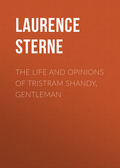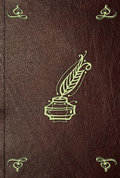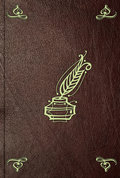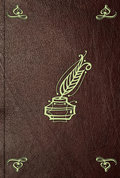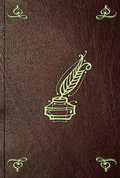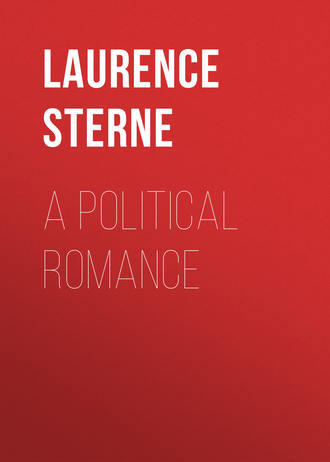
Лоренс Стерн
A Political Romance
This Explanation had too much Ingenuity in it to be altogether slighted; and, in Truth, the worst Fault it had, seem'd to be the prodigious Heat of it; which (as an Apothecary, who sat next the Fire, observ'd, in a very low Whisper to his next Neighbour) was so much incorporated into every Particle of it, that it was impossible, under such Fermentation, it should work its defined Effect.
This, however, no way intimidated a little valiant Gentleman, though he sat the very next Man, from giving an Opinion as diametrically opposite as East is from West.
This Gentleman, who was by much the best Geographer in the whole Club, and, moreover, second Cousin to an Engineer, was positive the Breeches meant Gibraltar; for, if you remember, Gentlemen, says he, tho' possibly you don't, the Ichnography and Plan of that Town and Fortress, it exactly resembles a Pair of Trunk-Hose, the two Promontories forming the two Slops, &c. &c.—Now we all know, continued he, that King George the First made a Promise of that important Pass to the King of Spain:—So that the whole Drift of the Romance, according to my Sense of Things, is merely to vindicate the King and the Parliament in that Transaction, which made so much Noise in the World.
A Wholesale Taylor, who from the Beginning had resolved not to speak at all in the Debate,—was at last drawn into it, by something very unexpected in the last Person's Argument.
He told the Company, frankly, he did not understand what Ichnography meant:—But as for the Shape of a Pair of Breeches, as he had had the Advantage of cutting out so many hundred Pairs in his Life-Time, he hoped he might be allowed to know as much of the Matter as another Man.
Now, to my Mind, says he, there is nothing in all the Terraqueous Globe (a Map of which, it seems, hung up in his Work-Shop) so like a Pair of Breeches unmade up, as the Island of Sicily:—Nor is there any thing, if you go to that, quoth an honest Shoe-maker, who had the Honour to be a Member of the Club, so much like a Jack-Boot, to my Fancy, as the Kingdom of Italy.—What the Duce has either Italy or Sicily to do in the Affair? cries the President, who, by this Time, began to tremble for his Hypothesis,—What have they to do?—Why, answered the Partition-Treaty Gentleman, with great Spirit and Joy sparkling in his Eyes,—They have just so much, Sir, to do in the Debate as to overthrow your Suppositions, and to establish the Certainty of mine beyond the Possibility of a Doubt: For, says he, (with an Air of Sovereign Triumph over the President's Politicks)—By the Partition-Treaty, Sir, both Naples and Sicily were the very Kingdoms made to devolve upon the Dauphin;—and Trim's greasing the Parson's Boots, is a Devilish Satyrical Stroke;—for it exposes the Corruption, and Bribery made Use of at that Juncture, in bringing over the several States and Princes of Italy to use their Interests at Rome, to stop the Pope from giving the Investitures of those Kingdoms to any Body else.—The Pope has not the Investiture of Sicily, cries another Gentleman.—I care not, says he, for that.
Almost every one apprehended the Debate to be now ended, and that no one Member would venture any new Conjecture upon the Romance, after so many clear and decisive Interpretations had been given. But, hold,—Close to the Fire, and opposite to where the Apothecary sat, there sat also a Gentleman of the Law, who, from the Beginning to the End of the Hearing of this Case, seem'd no way satisfied in his Conscience with any one Proceeding in it. This Gentleman had not yet opened his Mouth, but had waited patiently till they had all gone thro' their several Evidences on the other Side;—reserving himself, like an expert Practitioner, for the last Word in the Debate. When the Partition-Treaty-Gentleman had finish'd what he had to say,—He got up,—and, advancing towards the Table, told them, That the Error they had all gone upon thus far, in making out the several Facts in the Romance,—was in looking too high; which, with great Candor, he said, was a very natural Thing, and very excusable withall, in such a Political Club as theirs: For Instance, continues he, you have been searching the Registers, and looking into the Deeds of Kings and Emperors,—as if Nobody had any Deeds to shew or compare the Romance to but themselves.—This, continued the Attorney, is just as much out of the Way of good Practice, as if I should carry a Thing slap-dash into the House of Lords, which was under forty Shillings, and might be decided in the next County-Court for six Shillings and Eight-pence.—He then took the Romance in his Left Hand, and pointing with the Fore-Finger of his Right towards the second Page, he humbly begg'd Leave to observe, (and, to do him Justice, he did it in somewhat of a forensic Air) That the Parson, John, and Sexton, shewed incontestably the Thing to be Tripartite; now, if you will take Notice, Gentlemen, says he, these several Persons, who are Parties to this Instrument, are merely Ecclesiastical; that the Reading-Desk, Pulpit- Cloth, and Velvet Cushion, are tripartite too; and are, by Intendment of Law, Goods and Chattles merely of an Ecclesiastick Nature, belonging and appertaining 'only unto them,' and to them only.—So that it appears very plain to me, That the Romance, neither directly nor indirectly, goes upon Temporal, but altogether upon Church-Matters.—And do not you think, says he, softening his Voice a little, and addressing himself to the Parson with a forced Smile,—Do not you think Doctor, says he, That the Dispute in the Romance, between the Parson of the Parish and John, about the Height of John's Desk, is a very fine Panegyrick upon the Humility of Church-Men?—I think, says the Parson, it is much of the same Fineness with that which your Profession is complimented with, in the pimping, dirty, pettyfogging Character of Trim,—which, in my Opinion, Sir, is just such another Panegyrick upon the Honestly of Attornies.
Nothing whets the Spirits like an Insult:—Therefore the Parson went on with a visible Superiority and an uncommon Acuteness.—As you are so happy, Sir, continues he, in making Applications,—pray turn over a Page or two to the black Law-Letters in the Romance.—What do you think of them, Sir?—Nay,—pray read the Grant of the Great Watch-Coat and Trim's Renunciation of the Breeches.—Why, there is downright Lease and Release for you,—'tis the very Thing, Man;—only with this small Difference,– and in which consists the whole Strength of the Panegyric, That the Author of the Romance has convey'd and re-convey'd, in about ten Lines, —what you, with the glorious Prolixity of the Law, could not have crowded into as many Skins of Parchment.
The Apothecary, who had paid the Attorney, the same Afternoon, a Demand of Three Pounds Six Shillings and Eight-Pence, for much such another Jobb,—was so highly tickled with the Parson's Repartee in that particular Point,—that he rubb'd his Hands together most fervently,– and laugh'd most triumphantly thereupon.
This could not escape the Attorney's Notice, any more than the Cause of it did escape his Penetration.
I think, Sir, says he, (dropping his Voice a Third) you might well have spared this immoderate Mirth, since you and your Profession have the least Reason to triumph here of any of us.—I beg, quoth he, that you would reflect a Moment upon the Cob-Web which Trim went so far for, and brought back with an Air of so much Importance, in his Breeches Pocket, to lay upon the Parson's cut Finger.—This said Cob-Web, Sir, is a fine- spun Satyre, upon the flimsy Nature of one Half of the Shop-Medicines, with which you make a Property of the Sick, the Ignorant, and the Unsuspecting.—And as for the Moral of the Close-Stool-Pan, Sir, 'tis too plain, Does not nine Parts in ten of the whole Practice, and of all you vend under its Colours, pass into and concenter in that one nasty Utensil?—And let me tell you, Sir, says he, raising his Voice,—had not your unseasonable Mirth blinded you, you might have seen that Trim's carrying the Close-Stool-Pan upon his Head the whole Length of the Town, without blushing, is a pointed Raillery,—and one of the sharpest Sarcasms, Sir, that ever was thrown out upon you;—for it unveils the solemn Impudence of the whole Profession, who, I see, are ashamed of nothing which brings in Money.
There were two Apothecaries in the Club, besides the Surgeon mentioned before, with a Chemist and an Undertaker, who all felt themselves equally hurt and aggrieved by this discourteous Retort:—And they were all five rising up together from their Chairs, with full Intent of Heart, as it was thought, to return the Reproof Valiant thereupon.—But the President, fearing it would end in a general Engagement, he instantly call'd out, To Order;—and gave Notice, That if there was any Member in the Club, who had not yet spoke, and yet did desire to speak upon the main Subject of the Debate,—that he should immediately be heard.
This was a happy Invitation for a stammering Member, who, it seems, had but a weak Voice at the best; and having often attempted to speak in the Debate, but to no Purpose, had sat down in utter Despair of an Opportunity.
This Member, you must know, had got a sad Crush upon his Hip, in the late Election, which gave him intolerable Anguish;—so that, in short, he could think of nothing else:—For which Cause, and others, he was strongly of Opinion, That the whole Romance was a just Gird at the late York Election; and I think, says he, that the Promise of the Breeches broke, may well and truly signify Somebody's else Promise, which was broke, and occasion'd to much Disturbance amongst us.
Thus every Man turn'd the Story to what was swimming uppermost in his own Brain;—so that, before all was over, there were full as many Satyres spun out of it,—and as great a Variety of Personages, Opinions, Transactions, and Truths, found to lay hid under the dark Veil of its Allegory, as ever were discovered in the thrice-renowned History of the Acts of Gargantua and Pantagruel.
At the Close of all, and just before the Club was going to break up,– Mr. President rose from his Chair, and begg'd Leave to make the two following Motions, which were instantly agreed to, without any Division.
First Gentlemen, says he, as Trim's Character in the Romance, of a shuffling intriguing Fellow,—whoever it was drawn for, is, in Truth, as like the French King as it can stare,—I move, That the Romance be forthwith printed:—For, continues he, if we can but once turn the Laugh against him, and make him asham'd of what he has done, it may be a great Means, with the Blessing of God upon our Fleets and Armies, to save the Liberties of Europe.



